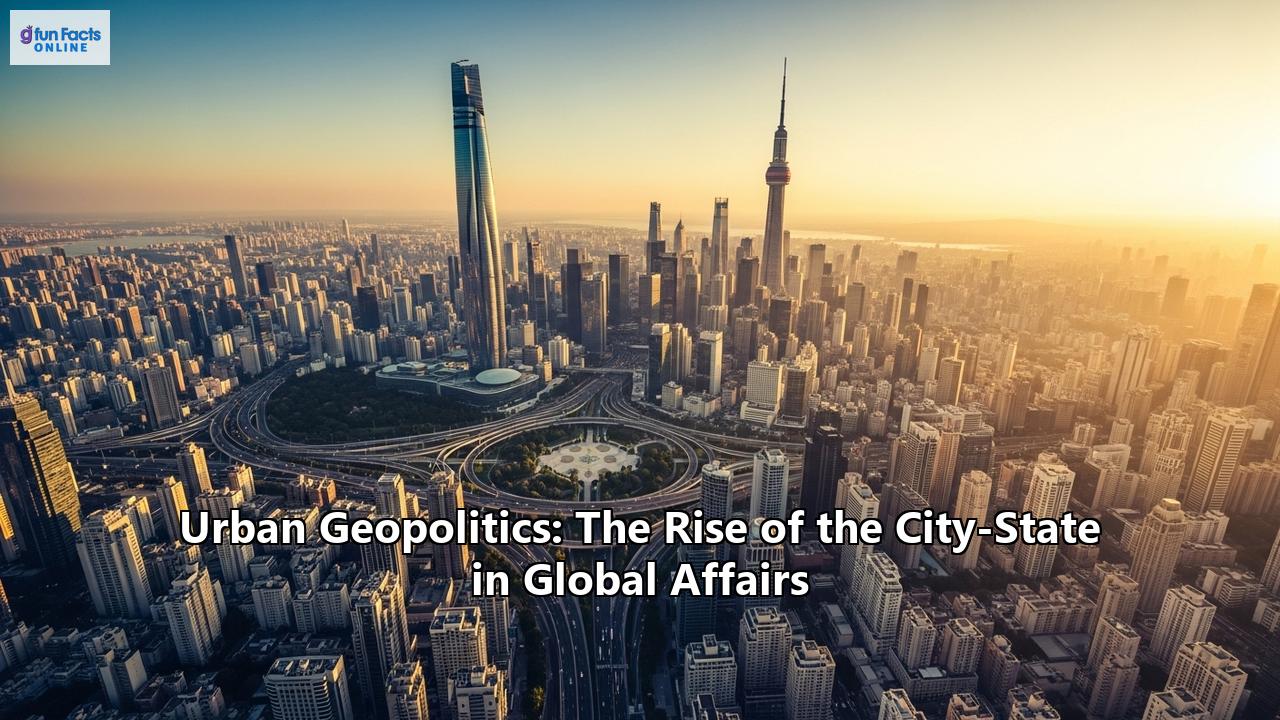In a world where nations once held undisputed sway over global affairs, a new and powerful actor is taking center stage: the city. After a 300-year hiatus, urban centers are re-emerging as pivotal players in mediating international relations, their influence growing in an era of unprecedented urbanization. If the 20th century was the century of the nation-state, the 21st is shaping up to be the century of the city. This shift is not merely a demographic trend; it represents a fundamental rewiring of the international system, with cities becoming the new nexuses of economic power, political innovation, and cultural exchange.
The Resurgence of the City-State: A Return to Historical Precedent
The idea of a city as a primary geopolitical unit is not new. History is replete with examples of powerful city-states that shaped the course of civilizations, from the ancient Greek poleis of Athens and Sparta to the mercantile hubs of the Italian Renaissance like Venice and Florence. These entities, characterized by their independent governance and economic dynamism, were centers of trade, innovation, and culture. The rise of the modern nation-state system, largely a product of the 18th and 19th centuries, temporarily eclipsed the city's role. However, the forces of globalization and the digital revolution are rendering national borders increasingly porous, creating a landscape where cities can once again thrive as key international actors.
The Economic Powerhouses of the 21st Century
Today's global cities are economic titans. A network of just 600 large and intermediate cities now accounts for an astonishing two-thirds of the world's GDP. To put this in perspective, the economic output of metropolitan Seoul, home to half of South Korea's population, surpasses that of most nation-states. New York City's annual budget of roughly $82 billion is larger than the national budgets of 160 countries. By 2050, it's estimated that 70% of the world's population will reside in urban areas, with cities generating over 80% of the global GDP. This immense economic clout gives cities significant leverage on the world stage, allowing them to forge their own international agendas. The world's largest financial institutions, for instance, are concentrated in just nine major cities: London, Singapore, New York, Zurich, Hong Kong, Chicago, Tokyo, Frankfurt, and Shanghai.
The Rise of City Diplomacy and Global Governance
Beyond their economic might, cities are also becoming increasingly active in the realm of international diplomacy. Faced with transnational challenges like climate change, migration, and pandemics that often overwhelm the capacities of nation-states, mayors and city leaders are stepping into the void. They are forming powerful networks and coalitions to address these issues directly, often bypassing national governments.
The C40 Cities Climate Leadership Group, a network of nearly 100 major cities, is a prime example. This group has been instrumental in pushing for aggressive climate action, arguably laying the groundwork for international agreements like the 2015 Paris Accord. Similarly, the Global Covenant of Mayors for Climate & Energy has garnered over 10,000 signatories worldwide, demonstrating the collective power of cities to drive global change. These "city diplomats"—a new corps of mayors, urban planners, and local leaders—are forging a new layer of global governance.
This rise in city diplomacy is not without its complexities. The relationship between cities and their national governments can be fraught with tension, as cities' international ambitions may not always align with the national agenda. However, there is a growing recognition that empowering cities can also augment the power of the state to deal with global challenges.
The Geopolitical Landscape of the Future: Megacities and Strategic Competition
The increasing importance of cities has not gone unnoticed by major world powers. Large-scale infrastructure and urbanization have become central to strategic competition between nations. Initiatives like China's Belt and Road Initiative, the G7's Build Back Better World, and the EU's Global Gateway are all aimed at influencing connectivity and urban spaces beyond their borders. This creates a new geopolitical reality where cities themselves become arenas for great power competition.
Parag Khanna, a prominent author on the subject, argues that 21st-century competition will be less about borders and more about connectivity, with networks of pipelines, cables, and infrastructure linking powerful megacities. He predicts that as many as 40 megacities will dominate the global economy by 2025, operating almost as independent entities from their home countries.
Challenges and Opportunities on the Urban Frontier
The rise of the city-state is not without its challenges. Rapid and often unplanned urbanization is putting immense strain on infrastructure, housing, and public services. Issues of inequality, social segregation, and environmental sustainability are becoming increasingly acute in these sprawling urban centers.
However, these challenges also present opportunities for innovation. Cities are serving as "urban laboratories," incubating intelligent solutions to pressing global dilemmas. From developing sustainable infrastructure and integrated public transport to fostering more inclusive forms of democratic participation, cities are at the forefront of creating a more livable and resilient future. The private sector is also playing a crucial role, investing heavily in the innovative solutions needed to meet the immense needs of growing urban populations.
The Dawn of a New Urban Era
The evidence is clear: we are living in an increasingly urban world, and the city is re-emerging as a central actor in global affairs. These dynamic hubs of economic activity, cultural exchange, and political innovation are not just shaping the lives of their inhabitants; they are fundamentally reconfiguring the global order. As the lines between the local and the global continue to blur, the rise of the city-state represents a paradigm shift in international relations. The future, it seems, will not be dictated solely by nations, but will be built, negotiated, and governed in the bustling metropolises that are humanity's greatest creation.
Reference:
- https://igarape.org.br/how-cities-are-rewiring-international-affairs/
- https://www.ebsco.com/research-starters/politics-and-government/city-state
- https://library.fiveable.me/key-terms/ap-world/city-states
- https://www.numberanalytics.com/blog/evolution-city-states-historical-perspective
- https://www.futuresplatform.com/blog/city-states-wave-future
- https://yipinstitute.org/capstone/cultivating-the-city-of-the-21st-century
- https://thecityfix.com/blog/how-cities-are-shaping-international-relations-juliana-kerr/
- https://responsiblestatecraft.org/2019/12/20/why-its-important-that-cities-are-becoming-major-players-in-international-affairs/
- https://globalaffairs.org/commentary-and-analysis/blogs/global-cities-international-system-new-era-governance
- https://www.institutmontaigne.org/en/expressions/cities-never-sleep-reinventing-diplomacy
- https://www.diplomaticourier.com/posts/city-diplomats-from-seat-at-the-table-to-hot-seat
- https://jia.sipa.columbia.edu/news/city-diplomacy-back-home-central-local-tensions-time-global-urban-governance
- https://globalaffairs.org/explore-research/center-global-cities/cities-infrastructure-and-geopolitics-project
- https://www.triplepundit.com/story/2016/are-megacities-new-world-order/26131
- https://www.researchgate.net/publication/342976548_21_ST_CENTURY_CHALLENGES_-_HOW_DO_CITIES_COPE
- https://blogs.iadb.org/ciudades-sostenibles/en/inclusive-cities/
- https://www.quora.com/Which-are-the-major-challenges-for-cities-in-the-21st-century
- https://blogs.adb.org/blog/how-developing-cities-can-meet-challenges-21st-century
- https://www.atlanticcouncil.org/in-depth-research-reports/issue-brief/foreign-policy-for-an-urban-world-global-governance-and-the-rise-of-cities/
- https://www.mckinsey.com/featured-insights/urbanization/when-cities-rule-the-world
- https://carnegieendowment.org/research/2024/12/will-major-cities-continue-to-shape-global-economic-governance?lang=en

